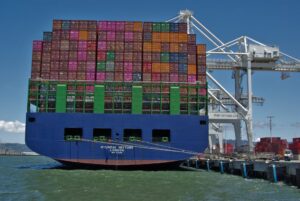In a recent blog post, the CEO of Forth Ports has confirmed that despite the COVID-19 (Coronavirus) pandemic the new Tilbury2 terminal is set to open in April.
A blog post released by Charles Hammond, CEO of Forth Ports, owner of the Port of Tilbury, talks of the new British port coming to market.
The post said while global leaders are preoccupied [with the coronavirus], now is a good time to focus on progress that is being made elsewhere, and a development that will be crucial to London’s future.
“In less than a month’s time, a new port will come to market,” the statement said.
The new terminal on the outskirts of London, Tilbury2, will inject a transformational amount of ferry capacity into the south east of England.
Tilbury’s owners, the Forth Ports group, are investing £250 million in a new 160-acre site to create the UK’s largest unaccompanied freight ferry port and the biggest construction processing hub to feed the burgeoning domestic housing market.
Occupying the old Tilbury Power Station site just outside the M25, P&O Ferries will start operating the new terminal with significant headroom to grow their network of ferry connections to northern Europe.
They expect the Tilbury-Zeebrugge route to rival Calais-Dover as a gateway to Britain within 10 years, according to the post.
From wines and dairy, an increasing range of the consumable goods London’s supermarkets need will be fed through Tilbury.
Hammond continues, Tilbury2 will be Brexit match fit when the first ship docks at the start of April. Alongside other internationally oriented port operators, we have extensive experience of non-EU trade, and look forward to embracing the market opportunities on the horizon.
Tilbury2 is a high-quality addition to Britain’s infrastructure capability — and sustainability hardwired throughout, Hammond notes. Its unaccompanied freight ferry traffic model is less carbon intensive than alternatives, by removing lorry-based road miles, avoiding large tracts of the congested road network, and taking the goods closer to the heart of the biggest consumer market in Europe.
The path to greater low carbon-based productivity gains is mapped out — from supporting the electrification of vessels to switch to low carbon alternative energy sources, to the extension of our onsite rail facilities to accommodate the longest freight trains and barge loading services to ship goods to the heart of the capital.
But there is more to do, Hammond says.
The Thames has enormous potential to continue to grow as a low carbon highway from the ports in Thurrock to the population in the west. Take the Corporation of London’s proposed consolidation of the markets in Dagenham, connected to the global terminals and onto consumers using the sustainable distribution of the Thames.
The Tilbury2 project concludes our £1 billion investment programme that began eight years ago.









